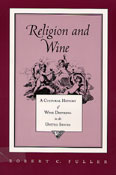Religion and Wine
A Cultural History of Wine Drinking in the United States

Wine, more than any other food or beverage, is intimately associated with religious experience and celebratory rituals. Nowhere is this seen more clearly than in American cultural history. From the Pilgrims at Plymouth Rock to the Franciscans and Jesuits who pioneered California’s Mission Trail, many American religious groups have required wine to perform their sacraments and enliven their evening meals. This book tells the story of how viniculture in America was started and sustained by a broad spectrum of religious denominations. In the process, it offers new insights into the special relationship between wine production and consumption and the spiritual dimension of human experience.
Robert Fuller’s historical narrative encompasses a fascinating array of groups and individuals, and the author makes some provocative connections between the love of wine and the particularities of religious experience. For example, he speculates on the ways in which Thomas Jefferson’s celebrated knowledge of wine related to his cultural sophistication and free-thinking outlook on matters of religion and spirituality. Elsewhere he describes how a number of nineteenth-century communal groups—including the Rappites, the Amana colonies, the Mormons, and the spiritualist colony called the Brotherhood of the New Life—helped to spread the religious use of wine across a vast new nation. Fuller describes and analyzes the role of wine drinking in promoting community solidarity and facilitating a variety of religious experiences, ranging from the warm glow of ritualized camaraderie to the ecstasy of immediate contact with otherwise hidden spiritual realms. He also devotes a chapter to the rise of temperance and prohibitionist sentiments among fundamentalist Christians and their subsequent attack on wine drinking.
The book’s concluding chapter features an insightful analysis of the ritual dimensions of contemporary wine drinking and wine culture. According to Fuller, the aesthetic experiences and communal affirmation that some religious groups have historically associated with the enjoyment of wine have passed into the practice of popular—or “unchurched”—religion in the United States.
The Author: Robert C. Fuller is professor of religious studies and director of the honors program at Bradley University in Peoria, Illinois. His previous books include Ecology of Care, Naming the Antichrist, Religion and the Life Cycle, Alternative Medicine and American Religious Life, and Americans and the Unconscious.
